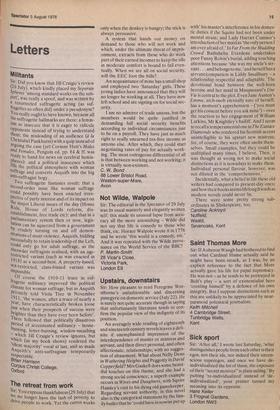Militants
Sir: Did you know that Jill Craigie's review (29 July), which kindly placed my Separate S.Pheres 'among standard works on the subject', was really a spoof, and was written by a resurrected suffragette acting (as suffragettes so often did) under a pseudonym? You really ought to have known, because all the suffragette hallmarks are there: a feminism so insecure that it is eager to ridicule °PPonents instead of trying to understand them: the misleading of an audience (a la Christabel Pankhurst) with a quip instead of arguing the case (yet Corinne Hutt's Males and Females, Penguin ed. pp. 84 & ff. was ready to hand for news on cerebral hemispheres): and a political innocence which fills the political atmosphere with woman suffrage and converts Asquith into the big anti-suffragist bogy. Two suffragette fantasies result: that a second-order issue like woman suffrage could possibly have been enacted irresPective of party interest and of its impact on the major Liberal issues of the day (Home Rule, House of Lords reform, disestablishment, free trade etc): and that in a Parliamentary system then or now, legislation can be squeezed from a government bY crudely turning on and off demonstrations of stunt violence. Asquith, bidding successfully to retain leadership of the Left, could only go for adult suffrage, as the Shrewder suffragists realised, with an agerestricted variant (such as was enacted in 1918) as a second-best. A property-based, 8. ex-restricted, class-biased variant was impossible.
Of course the 1910-11 truce in suffragette militancy improved the political climate for woman suffrage, but as Asquith Privately told Viola Tree in November 1911, 'the women, after a truce of nearly a Year, have characteristically broken loose liiSt when their prospects of success were brighter than they have ever been before'. There followed that politically disastrous Period of accentuated militancy — houseburning, letter-burning, window-smashing — Which Jill Craigie's review ignores, but Which (as my book shows) rendered the Silent majority' vocal at last, and so made Asquith's anti-suffragism temporarily respectable.
Brian Harrison
Corpus Christi College, Oxford






























 Previous page
Previous page